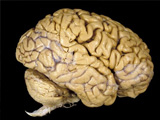Today.Az » Weird / Interesting » Bodyguard for the brain: Researchers identify mechanism that seems to protect brain from aging
14 July 2011 [15:30] - Today.Az
 Researchers from the Universities of Bonn and Mainz have discovered a mechanism that seems to protect the brain from aging. In experiments with mice, they switched off the cannabinoid-1 receptor. As a consequence, the animals showed signs of degeneration -- as seen in people with dementia -- much faster.
Researchers from the Universities of Bonn and Mainz have discovered a mechanism that seems to protect the brain from aging. In experiments with mice, they switched off the cannabinoid-1 receptor. As a consequence, the animals showed signs of degeneration -- as seen in people with dementia -- much faster.
The research results are presented in a current issue of the Proceedings of the National Academy of Sciences (PNAS).
Humans are getting older and older, and the number of people with
dementia is increasing. The factors controlling degeneration of the
brain are still mostly unknown. However, researchers assume that factors
such as stress, accumulation of toxic waste products as well as
inflammation accelerate aging. But, vice versa, there are also
mechanisms that can -- like a bodyguard -- protect the brain from
degenerating, or repair defective structures.
Researchers from the Universities of Bonn and Mainz have now
discovered a hitherto unknown function of the cannabinoid-1 receptor
(CB1). A receptor is a protein that can bind to other substances,
triggering a chain of signals. Cannabinoids such as THC -- the active
agent in cannabis sativa -- and endocannabinoids formed by the body bind
to the CB1 receptors. The existence of this receptor is also the reason
for the intoxicating effect of hashish and marijuana.
Not only does the CB1 receptor have an addictive potential, but it
also plays a role in the degeneration of the brain. "If we switch off
the receptor using gene technology, mouse brains age much faster," said
Önder Albayram, principal author of the publication and a doctoral
student on the team of Professor Dr. Andreas Zimmer from the Institut
für Molekulare Psychiatrie at the University of Bonn. "This means that
the CB1 signal system has a protective effect for nerve cells."
Mice prove their brain power in a pool
The researchers studied mice in different age categories -- young six
week old animals, middle-aged ones at five months, and those of an
advanced age at 12 months. The animals had to master various tasks --
first, they had to find a submerged platform in the pool. Once the mice
knew its location, the platform was moved, and the animals had to find
it again. This was how the researchers tested how well the rodents
learned and remembered.
The animals in which the CB1 receptor had been switched off (the
knock-out mice) clearly differed from their kind. "The knock-out mice
showed clearly diminished learning and memory capacity," said
Privatdozent Dr. Andras Bilkei-Gorzo from Professor Zimmer's team, who
led the study. So, animals that did not have the receptor were less
successful in their search for the platform. "In addition, they showed a
clear loss of nerve cells in the hippocampus," he explained further.
This part of the brain is the central area for forming and storing
information. In addition, the researchers found inflammation processes
in the brain. As the mice advanced in age, the degenerative processes
became increasingly noticeable.
Amazing parallels with the human brain
The animals with the intact CB1 receptor, to the contrary, did
clearly better with regard to their learning and memory capabilities, as
well as the health of their nerve cells. "The root cause of aging is
one of the secrets of life," commented Albayram. This study has begun to
open the door to solving this enigma. The processes in the mouse brains
have a surprising number of parallels with age-related changes in human
brains. So, the endocannabinoid system may also present a protective
mechanism in the aging of the human brain.
The principal author cautioned, "This will require additional
research." The scientists would like to better understand the mechanism
by which CB1 receptors protect the brain from inflammation processes.
And based on these signal chains, it might then be possible to develop
substances for new therapies.
/Science Daily/
|